Online Sunday Liturgy
April 11, 2021
|
| |
|
Bulletin Cover
|
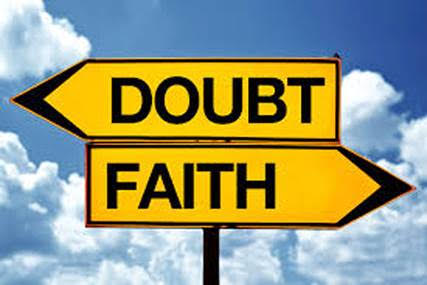
Thomas seems to have been a gruff man…. [But] Thomas, who
although crude and simpleminded, is not unfaithful and
malicious…. He is thinking, “I would like to believe that Christ
rose from the dead, if I only could”…. In this way Thomas had
the old faith in Jesus who was crucified; but he cannot
understand that he should be resurrected and would sincerely
like to see that it is true. Christ seeks him faithfully, bears
his obstinacy, and helps him to faith…. Christ… treats us
neither sternly nor harshly, but
seeks us out and comforts us as
sheep gone astray.
Martin Luther, Sermon on John 20:19–31 (1534),
Luther’s House Postils,
ed. E. Klug, 1996, 2:58–59.
|
|
Online Abbreviated Sunday Liturgy
Pastor Marshall
April 11, 2021
Second Sunday of Easter
In the Name of God the Father, Son, and Holy Spirit. Amen.
Let us pray: Almighty God, we have celebrated with joy our
Lord’s resurrection on Easter Day. In your mercy bring us to the
true font of wisdom. May we grow in grace to overcome the
darkness of our minds with the twofold beam of your light and
love. Turn our ignorance and doubts into obedience. Make us keen
to understand, quick to learn, and able to recall all that you
have taught us. In the name of Jesus we pray. Amen.
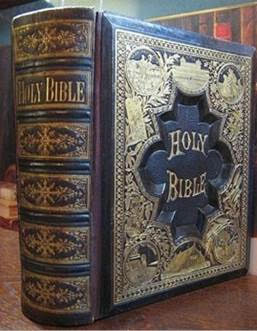
|
First Lesson:
Acts 3:13–26
Psalm 148
Second Lesson:
1 John 5:1–6
Gospel: John 20:19-31
|
Opening Hymn:
“Come, You Faithful, Raise the Strain” (LBW 132)
https://www.youtube.com/watch?v=pbQ_5pzRllM
|
|
| |
|
|
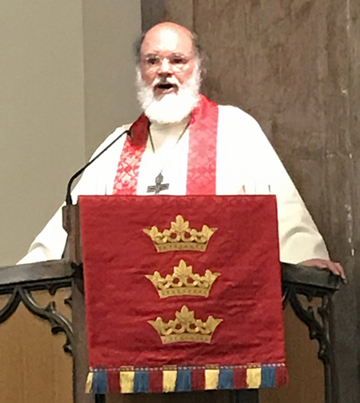
Sermon: April 11, 2021
Don't Doubt
(John 20:27)
Grace and peace to you in the name of God the Father, Son, and
Holy Spirit. Amen.
Jesus never budges. Again and again he tells us not to doubt him
(John 20:27, Matthew 14:13, 21:21). He doesn’t think doubt enriches our Christian lives. Doubt doesn’t make us
sophisticated believers – building in us courage and insightfulness (contra
Paul Tillich, Dynamics of
Faith, 1957, pp. 18–22). Neither is it the hallmark of our
identity as followers of Christ Jesus. Our faith isn’t
about
dubito ergo sum– “I
doubt, therefore I am” (Rene Descartes,
The Philosophical Works,
1969–70, I:219, 324). It instead is about
oro ergo sum – “I
pray therefore I am.” For the goal isn’t investigation and
discovery, but dependence and obedience. Becoming “slaves of
God” is our rightful aspiration (Romans 6:22). Because of that,
“answering back” to God has no place in Christian living (Romans 9:20). Hearing and
keeping his word is enough (Luke 11:28). Doubt politicians all
you want – for people aren’t trustworthy (Luther’s
Works 45:123, Jeremiah 17:5; John R. Lott, Jr., “A River of
Doubt Runs Through Mail Voting in Big Sky Country,” The
Square Center, March 24, 2021). And be sure to check over your
mathematical calculations, for you could have slipped up. But
when it comes to the message of the church, it “must rest on
certainty” (LW
13:140). “For faith is and must be a confidence of the heart
which does not waver, reel, tremble, fidget, or doubt but
remains constant and is sure of itself.” That’s because “the Word
of our God… is steadfast, it is certain, it does not give way,
it does not quiver, it does not sink, it does not fall, it does
not leave you in the lurch. And where this Word enters the heart
in true faith, it fashions the heart like unto itself, it makes
it firm, certain, and assured. It becomes buoyed up, rigid, and
adamant over against all temptation, devil, death,… that it
defiantly and haughtily despises and mocks everything that
inclines toward doubts, despair, anger, and wrath; for it knows
that God’s Word cannot lie to it” (LW
15:272). Therefore
we do “holy Scriptures the honor of believing firmly that none
of their writers has ever erred” (LW 32:11). With this godly
certainly we soar among the clouds – we’re “borne aloft above the clouds [where]
everything is lofty and heavenly” (LW
8:165, 167). Glory be to God! So when it comes to his holy
word, “don’t find fault with it, and dispute it. Just hear it.
[Don’t] probe it, measure it, and twist the words to read as you
want them to, brood over them, hesitate, doubt, and then judge
them according to your reason. [Instead] tread your wisdom
underfoot” (LW 23:229–30).
This, of course, appalls the intellectually respectable. Certainty
like that, they say, leads to extremism which can easily lead to physical
violence. So the better part of wisdom calls Christians to hold
their horses. Back off and become lukewarm again (contra
Revelation 3:16). The Christian’s “imperialistic certainty” must
give way to moderation. For “love of truth demands commitment to
open-ended exchange” (Morson & Schapiro,
Minds Wide Shut: How the
New Fundamentalisms Divide Us, 2021, pp. 25, 56, 74). The
irony in this critique, however, is that it’s a case of the “pot calling
the kettle black.” So the moral alternative to Christianity isn’t
free of the very indictment that it levels against devout
Christians. It’s like complaining about complainers. Or being
sure that it’s wrong to be sure. No advance
here. Nothing morally superior at all. Just a standoff. So this
critique of Christian
certainty resolves nothing. All it does is show a conflict of
convictions – the determined Christian against the cautious
secularist. So Christians had better “stand fast like a wall” (LW
60:106). That’s because there’s nothing convincing calling them to the contrary. In fact,
if they were to move toward moderation, conciliation and
compromise, God no longer could help them (James 1:6–8). They
would then
lose their distinctive blessing – “the defiance and arrogance of the Holy Spirit” (LW
24:118, 15:275). For “a
wavering heart… will certainly receive nothing. For our Lord God
can give such a person nothing…. It is as if you have a vessel
in your hand, but refuse to hold it still and keep waving it
back and forth…. That’s the way it is with an unbelieving,
wavering heart. God yearns to give us what we need, but we stand
there like crazy beggars. We hold out our hat,… but keep on
moving it around, refusing to hold it still” (Luther’s
House Postils, ed. E. Klug, 1996, 2:423). This is serious business and it’s mostly
laughed-off today. May we never forget, however, that “when the
heart has doubts... it is also driven in a short moment to
blasphemy and despair” (LW 4:144). Now if that goes
un-rectified, we’ll have hell to pay for it, given the severe
wretchedness of blasphemy. So doubters aren’t heroes. They’re
“sheep gone astray” (LHP 2:59).
To bring us back home and help us out of this jam, Christ sets another example for us. He remains still
and keeps focused. His “steadfastness” marks him indelible (2
Thessalonians 3:5). “He set his face to go to Jerusalem” and
never looked back (Luke 9:51, 13:33, 23:46). He dies on the
cross rather than running from it. He sacrifices his life on it to save us from our
sins (Hebrews 9:26). He is “the Lamb of God who takes away the
sin of the world” (John 1:29). He follows God’s “definite plan”
exactly (Acts 2:23). He knows that “no one who puts
his hand to the plow and looks back is fit for the kingdom of
God” (Luke 9:62). The more we fiddle around, the less gets done.
For “nothing can be so pointedly argued with reason which cannot
also be refuted by reason” (LW
39:219). The debates are endless
– as we see today in what’s being disputed regarding
sexual freedom (Our
Monica, Ourselves: The Clinton Affair and the National Interest,
ed. Berlant & Duggan, 2001, pp. 304–311). This leaves us “hanging in
doubt;” “fallen into doubt” (LW
79:81, 82). Christians, therefore, must cut this short and
“confess and lament” their weakness of faith and hardness of
heart, that they cannot bring the love for Christ into their
hearts “with as strong a faith as they ought.” And so they have
to “fight and contend against their weakness all their lives” (LW
77:46). So we also “must fight against doubt” (LW
73:392). And that’s because faith is “such a great and difficult matter!” (LW 6:10). But without Christ our battles get nowhere. He has to
set the stage and send forth certainty
– “The Lamb of God is slain…. The true High Priest
has completed His offering; the Son of God has… offered up His
body and life as a payment for sin; sin has been blotted out;
God’s wrath appeased; death overcome; the kingdom of heaven won
and heaven opened” (LW
69:265). Those eight clear, straightforward and stunning victories give us breathing room
to live for Christ (2 Corinthians 5:15). They make the
impossible possible (Luke 18:27). Here, then, “is a great
certainty. This certainty depends only on strong faith, which
does not waver. Christ certainly will not waver. He is firm
enough. We should, then, emphasize faith and exercise it with
preaching, working, and suffering, so that it stands the test
and becomes firm” (LW
75:203). When the church does just that, it rightly says to
heretics: “Mine is the wisdom; to the Gentiles: Mine is
righteousness; to the Jews: Mine is worship and piety; to death:
Mine is life; to sin: Mine is peace and joy, not by myself or my
own strength, but through Jesus Christ.... This is a most
beautiful transformation, that the church, miserable in the eyes
of men, should be so richly adorned in the eyes of God” (LW
12:261).
Moving ahead, we in the church should then uphold that “what is
exalted among men is an abomination in the sight of God” (Luke
16:15). But we have to be careful here. While it’s true that
“faith apart from works is dead” (James 2:26), not just any
works will do. We can’t forget “that there are two kinds of
works: some are before and without faith; others are from and
after faith. As little as nature outside of faith can be idle,
and just as natural works do not make or precede nature but
nature must first exist and the works be produced out of and
from it, so also believing works do not make faith, but they
follow and are made by faith. For this reason, the works must be
present, but they do not merit or save; rather, all salvation
and merit must first be present in faith” (LW
79:84). And when it is, then the work of this conviction about
what’s exalted among us has its place in the Christian’s life. Much to our chagrin, the
world exalts the lukewarm and moderate (Revelation 3:16).
Christianity, however, calls us to fight against the evil in us
and around us (1 Timothy 6:12, Ephesians 6:12).This is our
constant state, for Christ, the Lord of the Church, is always
“surrounded” by enemies. “In the very center, where He is, He
will find the area full of enemies. There is no indication...
that Christ will reign anywhere else, or that His churches will
be found anywhere else, than in the midst of enemies. Who would
expect such a kingdom or believe that it could endure?” (LW
13:273). No wonder, then, that we’re
called to be godly “soldiers” (2 Timothy 2:3). And as soldiers,
we won’t
be averse to
running into danger and forgoing at least for a time our “petty
little lives” (Jane Blair,
Hesitation Kills: A
Female Marine Officer’s Combat Experience in Iraq, 2011, pp.
133, 274). May God be with us when we do just that, as we wage this
dangerous but good war (2 Corinthians 10:3–6)
– and pursue its goal which is not to doubt.
Amen.
Hymn of the Day: “Thine Is the Glory” (LBW
145)
|
|
|
|
|
Litany on the
Coronavirus Disease 2020 (COVID-19)
Let us pray for all those worldwide who have
died from COVID-19. Lord in your mercy,
HEAR OUR PRAYER.
Let us give thanks for the government
agencies and other medical research teams who are diligently
working to curb the spread of this virus. Lord in your mercy,
HEAR OUR PRAYER.
Let us pray for the many who are sick and
suffering from this disease. Lord in your mercy,
HEAR OUR PRAYER.
And let us also pray for all those grieving
the loss of loved ones who have died from COVID-19. Lord in your
mercy,
HEAR OUR PRAYER.
Let us pray for the many who are caring for
the infected and the sick, that full health and strength and
peace may be granted. Lord in your mercy,
HEAR OUR PRAYER.
Let us pray for our world where we’re but
sojourners (Psalm 119:19; Philippians 3:20), that we may not be
punished by disease and pestilence (Ezekiel 14:21, Luke 13:5,
John 5:14), and that health and peace may abound for all – for
it is Christ who takes upon himself “our infirmities and
diseases” (Matthew 8:17). Lord in your mercy,
HEAR OUR PRAYER.
Finally, in our fear of disease and sickness
– may we ever remember God’s power to heal (Jeremiah 17:14,
James 5:14), those many kept safe from COVID-19 and other
infectious diseases, and our Savior Jesus who, by his mercy and
in his time, rekindles our faith by restoring health in this
vulnerable and perilous life (2 Kings 5:14, Acts 3:6).
GLORY BE TO CHRIST OUR LORD & GREAT HEALER!
AMEN.
|
|
| |
|
LUTHER on epidemics
“Some people are of the firm opinion that one… should not run
away from a deadly plague. Rather, since death is God’s
punishment, which he sends upon us for our sins, we must submit
to God…. I cannot censure [this] excellent decision…. It takes
more than a milk faith [1 Corinthians 3:2] to await a death
before which most of the saints… are in dread…. [But since] it
is generally true of Christians that few are strong and many are
weak, one simply cannot place the same burden upon everyone….
Peter could walk upon the water because he was strong in faith.
When he began to doubt,… he sank and almost drowned [Matthew
14:30]…. Let him who has a strong faith wait for his death, but
he should not condemn those who take flight…. [Even so, know
that] all illnesses are punishments from God…. [These
punishments] come upon us, not only to chastise us for our sins
but also to test our faith and love…. [So] my dear friends,… use
medicines… which can help you; fumigate house, yard, and street;
shun persons and places wherever your neighbor… has recovered,
and act like a man who wants to help put out the burning city.
What else is the epidemic but a fire?... You ought to think this
way: ‘Very well, by God’s decree the enemy has sent us poison….
Therefore I shall ask God mercifully to protect us. Then I
shall… administer medicine and take it. I shall avoid places and
persons where my presence is not needed in order not to become
contaminated and thus perchance infect and pollute others, and
so cause their death as a result of my negligence. If God should
wish to take me, he will surely find me and I have done what he
has expected of me and so I am not responsible for either my own
death or the death of others. If my neighbor needs me, however,
I shall not avoid place or person but will go freely…. This is
such a God-fearing faith because it is neither brash nor
foolhardy and does not tempt God.’”
[Martin Luther, Whether One May Flee from a Deadly
Plague (1527),
Luther’s Works
43:120, 124, 127, 131–32.]
|
|
| |
|
Intercessions:
We remember in prayer church
members.
Leah &Melissa Baker
Marlis Ormiston
Eileen & Dave Nestoss
Connor Bisticas
Kyra Stromberg
Sam & Nancy Lawson
Melanie Johnson
The Tuomi Family
Bob Baker
Rollie
We also pray for friends of the
parish
who stand in need of God’s care.
Angel Lynn
Tabitha Anderson
The Rev. Randy Olson
The Rev. Howard Fosser
The Rev. Dan Peterson
The Rev. Mary Rowe
The Rev. Kari Reiten
The Rev. Alan Gardner
The Rev. Albin Fogelquist
Kari Meier
Heather Tutuska
Yuriko Nishimura
Leslie Hicks
Eric Baxter
Evelyn, Emily & Gordon Wilhelm
Garrett Metzler
Lesa Christensen
Noel Curtis
Antonio Ortez
Garrison Radcliffe
Richard Patishnock
Jeff Hancock
Holly & Terence Finan
Wayne & Chris Korsmo
Ty Wick
Lori Aarstad
Anthony Brisbane
Dona Brost
Susan Curry
Karin Weyer
Robert Shull family
Alan Morgan family
Geri Zerr & Mark
Julie Godinez
Lucy Shearer
Carolyn & Marv Morris
Ramona King
Karen Berg
Donna & Grover Mullen
Patty Johnson
Christine Berg
Kurt Weigel
Ethan, Erin and Kevin Vodka
Carol Estes
Tery Merritt
Paul Jensen
Mira Frohnmayer
Wendy Pegelow
Tak On Wong & Chee Li Ma
Steve Arkle
Hank Schmitt
Ron Combs
Pray for unbelievers, the addicted, the sexually abused and
harassed, the homeless, the hungry and the unemployed. Pray
for those killed and wounded in the mass shootings in Bryan,
Texas, and Rock Hill, South Carolina.
And pray for those suffering from the volcano eruptions in the
Caribbean island of Saint Vincent. Pray also for refugees throughout the world; and for the care and
keeping of our planet.
Birth
Averly LaRae Dike (Bonnie & Bruce Dike's sixteenth grandchild)
Professional Health Care Providers
Gina Allen
Jane Collins
Janine Douglass
David Juhl
Dana Kahn
Dean Riskedahl
|
|
| |
|
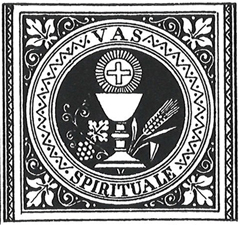
Holy Communion
in Spirit and Truth
Without the
Consecrated Bread and Wine
[The
ancient church doctrine of
concomitantia teaches that the faithful can receive Christ’s
Presence in Holy Communion by drinking the wine without eating
any bread, or by eating the bread without drinking any wine (The
Oxford Dictionary of the Christian Church, ed. F. L. Cross,
1958, 1966, pp. 320–21). By extension, in extreme cases, the
faithful can also, then, receive Christ’s Presence without
eating the bread or drinking the wine. Those would be cases of
illness when nothing can be ingested through the mouth, or when
lost in the wilderness – living off nothing but wild animals and
berries. In those cases we keep the memory of Jesus in the
Lord’s Supper (1 Corinthians 11:24) – honoring our Savior “in
spirit and truth” (John 4:23). So pray the words below, all you
baptized, who love the Lord Jesus, and “hunger and thirst for
righteous,” that you may be satisfied (Matthew 5:6). This is not
a substitute for Holy Communion, but rather a devout practice
when receiving Holy Communion in times of pestilence and plague
would recklessly endanger the church
(Luther’s
Works
43:132–33).]
Let us pray:
O Lord, our God, we remember this day our savior Jesus, who “was
put to death for our trespasses and raised for our
justification” (Romans 4:24). May his Spirit “bring to
remembrance” all that he did for us, and continues to do, to
bless us (John 14:26). Fill us with the assurance that our sins
are truly forgiven for his sake, and that the promise of eternal
life will not be taken away. Amen.
Let us pray:
On this day, heavenly Father, we also pray in the name of Jesus,
that one day soon we will be able to gather together at the
Altar of our church, and so eat of the flesh of our Lord and
drink of his blood, that his very life may well up in us so that
we may abide in him forever (John 6:53–56). Amen.
|
|
|
The Lord’s Prayer
Benediction: The Lord bless you and keep you; the Lord make his
face shine on you and be gracious to you; the Lord look upon you
with favor and give you peace. In the name of God the Father,
Son, and Holy Spirit. Amen.
Closing Hymn: “Savior, Again to Your Dear Name” (LBW 262)
https://www.youtube.com/watch?v=G3lJ2RLFO7s
|
|
| |
|
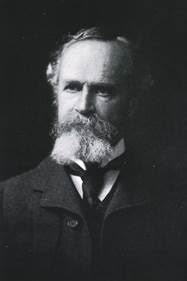
Professor William James
When I look at the religious question as it really puts itself
to concrete men, and when I think of all the possibilities which
both practically and theoretically it involves, then this
command that we shall put a stopper on our heart, instincts, and
courage, and wait – acting of course meanwhile more or less as
if religion were not true – till doomsday, or till such time as
our intellect and senses working together may have raked in
evidence enough – this command, I say, seems to me the queerest
idol ever manufactured in the philosophic cave.
(William James, The Will
to Believe, 1896, from the Conclusion,
Volume 9 in The Works of
William James, 19 Volumes,
Harvard University Press, 1975-1988.)
|
|
|